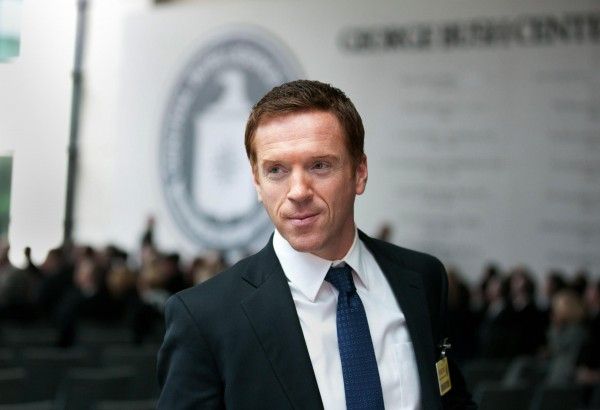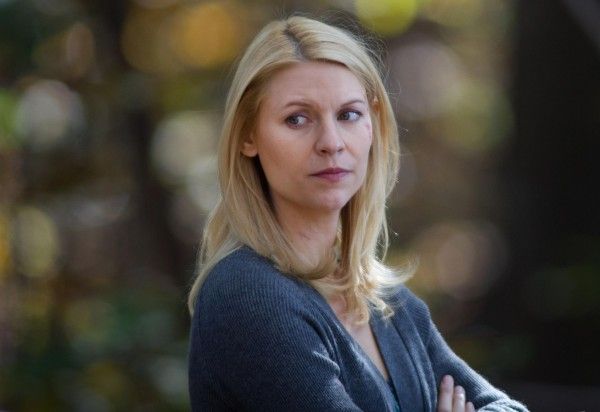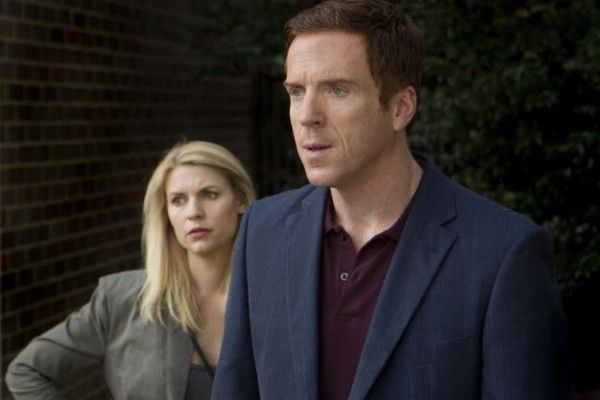If you follow Damon Lindelof on Twitter, you know that he's a huge fan of both The Walking Dead and Homeland (two of the best shows on television).  So when I spoke to him at the recent Star Trek Bad Robot press day (and during a follow up phone call), we talked about the success of The Walking Dead and his thoughts on the Homeland season 2 finale.  While Lindelof is not involved with either show, he's a passionate fan of both and thought you might like to hear his thoughts.Note: Massive Homeland spoilers are discussed. Do not read unless you are caught up.Collider: I think season three of The Walking Dead has been incredible. What’s your take on it so far?Lindelof: I’m a massive fan of the comic book and have been since the very beginning, and [comic creator Robert] Kirkman and I actually found each other and befriended each other in a pre-Twitter era just because I let everybody know who was listening how much I loved his stuff. So then when it got made into a TV show and I started watching it—it’s almost impossible to separate the two ideas, there is just only The Walking Dead. I know a lot of people say, “Well there’s the comic book and there’s the TV show,†but my feeling of fondness for it is really that show can kind of do no wrong. That being said, it’s been doing a tremendous amount of things very, very right, and I think that what’s exciting about it is that it can aberate from the comic book in really exciting ways, like Merle and Daryl, for example, who aren’t in the comic book become wild cards in that universe because they never existed in it before. So I do feel like anything can happen on that show and it’s tremendously exciting, but not at the cost of the big thematic leap. What’s interesting about that show is, you feel like the zombie thing has just been done to death; it’s just a dead trope, no pun intended, like there’s nothing new to say about zombies. But I think that that idea of—“The Walking Dead†is not the title for the zombies, it’s the title for the survivors, and the show plays in this ambiguous moral space of at what point are you no longer a human anymore? What behaviors will you engage in that are essentially sacrificing your own inherent morality or ethical sense of being? And wrapping that all up in some sort of very satisfying package where also zombie arms are getting torn off and heads are rolling and all those other things are happening, I think it’s an enormously tall order. A lot of the time as a geek, I will experience this thing where I was into something that was niche-y and cool, and then if it becomes successful in the mainstream, I feel bitterness towards the people who are now accepting it because they’re Johnny Comes Lately. It’s like the Seattle thing where it’s like, “I’ve seen Nirvana play for four years in small club and now you thing ‘Smells Like Teen Spirit’ is their first song? Go fuck yourself!â€Â That’s the way that you’ll feel when you first hear about Scott Pilgrim getting made or something like that, and then you go “Oh but it’s Edgar [Wright], so it’s gonna be okay.â€Â And then you sort of switch over to “I want this small little niche thing to reach widespread success,†the fact that there’s 10 million+ watching The Walking Dead every week and it’s a genre show that even on a network would be Top 10, or number one demo status, that’s amazing. That’s something that even Lost was never really able to accomplish in its heyday of being overtly genre and nobody cared, in fact the more genre Lost became, the more it tended to alienate a certain subset of viewers, but people accept the crazy zombie show at face value. In fact it’s picking up viewers, and that’s because the show’s so damn good. The [ex-showrunner Frank] Darabont and the [current showrunner Glen] Mazzara and all that aside, I really feel like Kirkman doesn’t get his due in terms of creating that world and populating it with really fascinating characters and interesting, original ideas that feel like they’re familiar enough if you’re a fan of the post-apocalyptic zombie genre, but you do feel like you’re seeing it in a way that you’ve never seen it before.The ratings are stunning. Have you heard anything from studios or creative people in terms of maybe certain networks are loosening up to ideas that were maybe too radical before?Lindelof: I definitely think anytime a genre show is successful, it opens the door to genre. That’s the nature of the beast, it happened with X-Files, it happened with us, it happened with Heroes, and now it’s happening with The Walking Dead, and that’s always exciting if you’re a fan of genre storytelling. But at the end of the day, nobody knows what the hell anybody wants to watch or they would only create hit shows and there would be no shitty shows. I don’t know what the history of The Walking Dead is, but if it’s anything like the history of Mad Men or the history of Breaking Bad, several other places passed on it before AMC said, “Okay let’s get me some zombie.â€Â Because the idea of like in a repressed economy, in a time of recession, who wants to see that? Who wants to see the dirty, gross people straggling through a post-apocalyptic United States that’s overrun by zombies. And the answer turned out to be everybody. Everybody wants to see that.Warning: Massive Homeland spoilers are discussed. Do not read unless you are caught up. Season two of Homeland ends in a way that Brody may or may not have done something. Do you watch it live as soon as it airs, and what were your thoughts on the season two finale?Damon Lindelof: I watch it very close to live. My wife and I put our son down at like 7:30, and then we got and watch Homeland. I think it starts at 7 if you’re watching it in HD on DirecTV—a shameless DirecTV plug—so pretty close to live because you wanna stay off Twitter.You’re preaching to the choir on this one.Lindelof: But here’s kind of my take on it: somebody moved Brody’s car. That’s all it comes down to for me. Putting all the emotional and character stuff aside, which is woven into that show and left intentionally vague, so the idea of what is Brody’s level of complicity in terms of the bombing on the CIA, that’s the question that you’re putting in front of me, my answer to you is someone moved Brody’s car. Because Brody parked his car in one place, and then he went in to the funeral and sat at the funeral, and then someone moved his car! This is a fact and it wasn’t him, it’s an undeniable fact. So the question really is, was Brody working in concert with some other agent of Abu Nazir’s who moved his car for him so that he could feign ignorance, or is he completely and totally innocent? He claims his innocence a couple times, most compellingly I think to Carrie in the immediate aftermath of the explosion, and had they not left that room they both would have been killed. Doesn’t Carrie get up first? Or does he get up first?
Season two of Homeland ends in a way that Brody may or may not have done something. Do you watch it live as soon as it airs, and what were your thoughts on the season two finale?Damon Lindelof: I watch it very close to live. My wife and I put our son down at like 7:30, and then we got and watch Homeland. I think it starts at 7 if you’re watching it in HD on DirecTV—a shameless DirecTV plug—so pretty close to live because you wanna stay off Twitter.You’re preaching to the choir on this one.Lindelof: But here’s kind of my take on it: somebody moved Brody’s car. That’s all it comes down to for me. Putting all the emotional and character stuff aside, which is woven into that show and left intentionally vague, so the idea of what is Brody’s level of complicity in terms of the bombing on the CIA, that’s the question that you’re putting in front of me, my answer to you is someone moved Brody’s car. Because Brody parked his car in one place, and then he went in to the funeral and sat at the funeral, and then someone moved his car! This is a fact and it wasn’t him, it’s an undeniable fact. So the question really is, was Brody working in concert with some other agent of Abu Nazir’s who moved his car for him so that he could feign ignorance, or is he completely and totally innocent? He claims his innocence a couple times, most compellingly I think to Carrie in the immediate aftermath of the explosion, and had they not left that room they both would have been killed. Doesn’t Carrie get up first? Or does he get up first? He’s looking a little bored like “Hey I wanna get out of here.â€Â I don’t remember if he signaled or if she does it, but I think it starts with him.Lindelof: Right, either way I think Brody is good, but he’s not a trained CIA assassin. And so we’ve been with him in moments where we’ve seen him be genuinely anxious, like when he’s killing the tailor, and I just can’t belive that he could be sitting there so close to the explosive and not be sweating it at all. Like he just seemed to have no idea that it was going to happen. And then Carrie is obviously asking the same question that you are, when they basically wake up in the office right after the blast has gone off and she draws down on him and she says “I think you did this,†he’s able to convince her that he didn’t and that this was Nazir’s play all along. Certainly there are black holes in the show. For that period of time that Brody was gone what did he and Nazir discuss? I know that there’s a very popular theory out there advanced by Emily Neusbaum that the entire Skype session between he and Nazir negotiating for Carrie’s life was all just played for her benefit so that Brody could maintain his cover as a double agent inside there. My brain starts to hurt when I follow sort of the logic of all of it, but I continue to hear [showrunners Howard] Gordon and [Alex] Ganza saying, you know the message that they’re giving in interviews is the story that they’re really invested in and interested in telling is the doomed romance between Carrie and Brody. If they were saying, “The interesting story that we want to tell is ‘Can you really ever trust someone?’†then I’d be like, “Okay, I don’t know what to make of Brody here.â€Â But I kind of feel like, the larger issue is in season three of the show what’s the messaging that we received at the end of season two? Binary question: Is Brody going to be a major part of the third season of the show, or is he not? If the answer is “he’s not,†then I think Brody didn’t blow up the CIA, and if the answer is, “he is,†then the answer is he probably did blow up the CIA. Because if he didn’t blow up the CIA, there’s really no story left with that guy, is there?
He’s looking a little bored like “Hey I wanna get out of here.â€Â I don’t remember if he signaled or if she does it, but I think it starts with him.Lindelof: Right, either way I think Brody is good, but he’s not a trained CIA assassin. And so we’ve been with him in moments where we’ve seen him be genuinely anxious, like when he’s killing the tailor, and I just can’t belive that he could be sitting there so close to the explosive and not be sweating it at all. Like he just seemed to have no idea that it was going to happen. And then Carrie is obviously asking the same question that you are, when they basically wake up in the office right after the blast has gone off and she draws down on him and she says “I think you did this,†he’s able to convince her that he didn’t and that this was Nazir’s play all along. Certainly there are black holes in the show. For that period of time that Brody was gone what did he and Nazir discuss? I know that there’s a very popular theory out there advanced by Emily Neusbaum that the entire Skype session between he and Nazir negotiating for Carrie’s life was all just played for her benefit so that Brody could maintain his cover as a double agent inside there. My brain starts to hurt when I follow sort of the logic of all of it, but I continue to hear [showrunners Howard] Gordon and [Alex] Ganza saying, you know the message that they’re giving in interviews is the story that they’re really invested in and interested in telling is the doomed romance between Carrie and Brody. If they were saying, “The interesting story that we want to tell is ‘Can you really ever trust someone?’†then I’d be like, “Okay, I don’t know what to make of Brody here.â€Â But I kind of feel like, the larger issue is in season three of the show what’s the messaging that we received at the end of season two? Binary question: Is Brody going to be a major part of the third season of the show, or is he not? If the answer is “he’s not,†then I think Brody didn’t blow up the CIA, and if the answer is, “he is,†then the answer is he probably did blow up the CIA. Because if he didn’t blow up the CIA, there’s really no story left with that guy, is there? Well I think part of the story could be the hunt for him.Lindelof: But how is that interesting?This is the other thing I wanted to address, when you have contracts with certain actors and they’re signed on for five years, sometimes the network obviously doesn’t wanna get rid of somebody who’s winning awards or is a fan favorite or is involved in a popular relationship or something. If the creators want to veer away from this but the network wants to keep an actor on the show, how does that play out?Lindelof: I don’t know David Nevins that well and I don’t know Howard Gordon and Alex Ganza that well, but I do believe that Howard and Alex have earned the right to tell exactly the story that they want to tell, and if they wanted to write Damian Lewis off the show, [I believe] that David Nevins would be okay with that because he has a reputation for being very friendly with creatives. So I don’t think that a network could force that big of a thing on someone, and if they had we would have seen evidence of it in the finale.I do think, though, that the show has done a phenomenal job at advancing story very quickly and moving it forward.Lindelof: I feel that way about most cable drama, though, where the idea of being able to tell seasonal arcs over 10 or 13 episodes, it’s all killer no filler.If you missed Lindelof talking about how he won't be writing the Prometheus sequel or how he's now writing 1952 with Brad Bird, click the links.
Well I think part of the story could be the hunt for him.Lindelof: But how is that interesting?This is the other thing I wanted to address, when you have contracts with certain actors and they’re signed on for five years, sometimes the network obviously doesn’t wanna get rid of somebody who’s winning awards or is a fan favorite or is involved in a popular relationship or something. If the creators want to veer away from this but the network wants to keep an actor on the show, how does that play out?Lindelof: I don’t know David Nevins that well and I don’t know Howard Gordon and Alex Ganza that well, but I do believe that Howard and Alex have earned the right to tell exactly the story that they want to tell, and if they wanted to write Damian Lewis off the show, [I believe] that David Nevins would be okay with that because he has a reputation for being very friendly with creatives. So I don’t think that a network could force that big of a thing on someone, and if they had we would have seen evidence of it in the finale.I do think, though, that the show has done a phenomenal job at advancing story very quickly and moving it forward.Lindelof: I feel that way about most cable drama, though, where the idea of being able to tell seasonal arcs over 10 or 13 episodes, it’s all killer no filler.If you missed Lindelof talking about how he won't be writing the Prometheus sequel or how he's now writing 1952 with Brad Bird, click the links.

